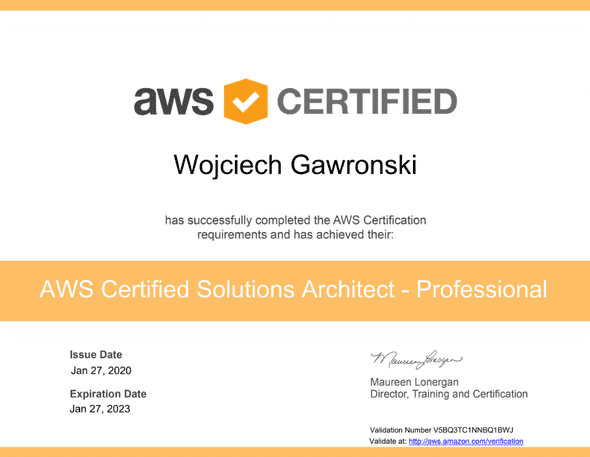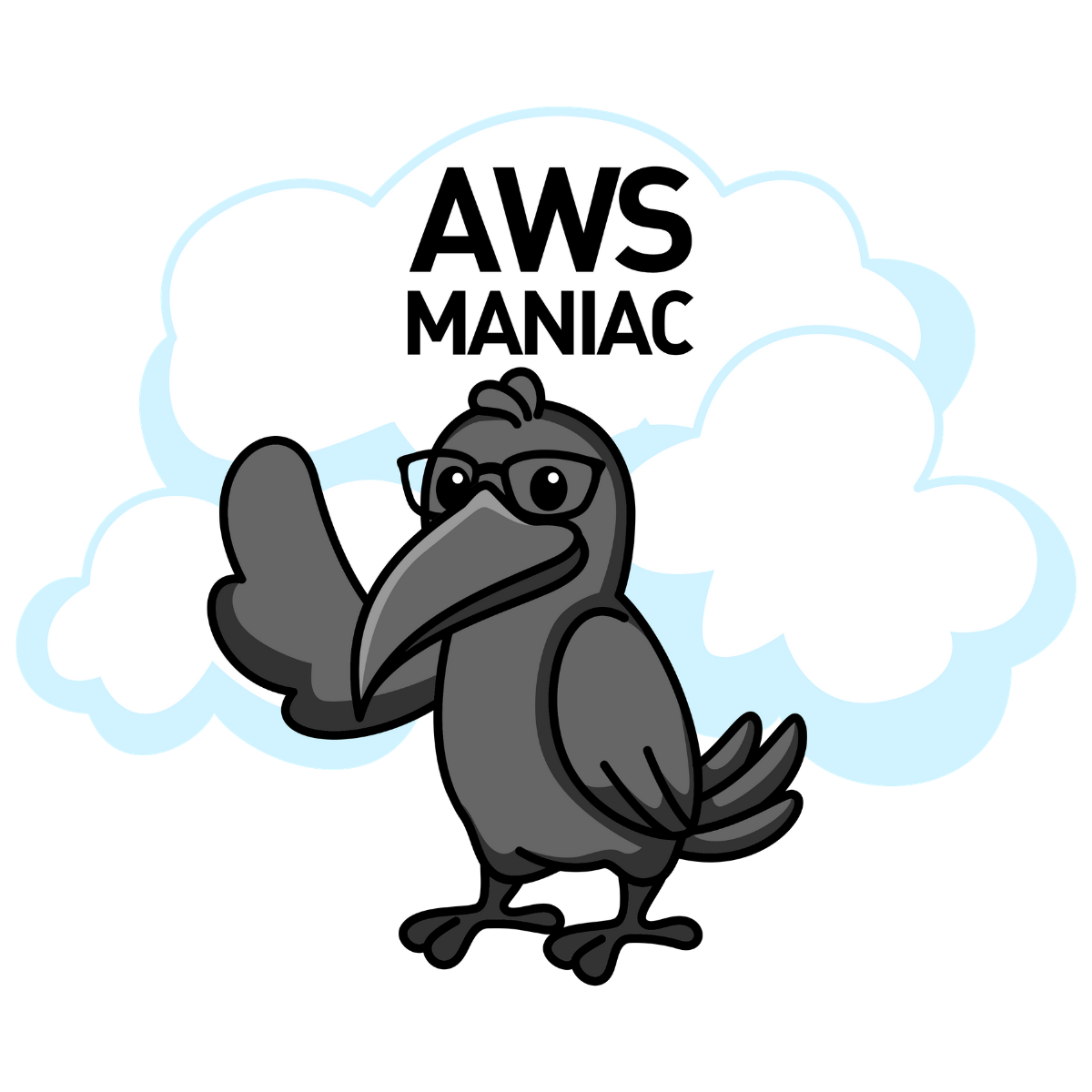The unofficial guide to AWS Certified Solutions Architect Professional Exam
9 min read, last updated on 2020-12-14

It’s 12:20 PM. I am sweaty and trying to regain full attention and focus after sitting tight for almost 2.5 hours. I have completed the first round of nearly 90 questions on my exam for AWS CSAP, and yet there are still 27 questions flagged for another review.
40 minutes to the full 3 hours. 💩. I will not make it.
I have made it. I have passed, but this was one of the toughest exams of my life. 4 months of daily preparations (yes, you read it correctly - at least 30 minutes of almost every day) and I have finished less than 5 minutes before the full-time. I have passed it at 92%, but I was not so sure when I have finished.
Scope? EVERYTHING. Starting from a use case for Amazon AppStream 2.0 to the details about AWS Direct Connect. No mercy: long questions with even longer answers.
If you are preparing for this “adventure”, you need to be ready like a Bear Grylls, and better, you’d be excited about it. To help you, I have summarized my preparation, the whole experience, and an extensive list of materials that should help you pass this exam.
Learning
I have spent 4 months learning, practicing, making notes, reading whitepapers, and watching an awful lot of videos. I tried to balance the effort and not perform any big-bang-like learning sessions. Besides a daily practice, I had my regular job, which focuses on AWS, so it helped tremendously.
If I can summarise the whole effort and learning process in one sentence, it would be:
Focus on your practice and deep-dive sessions from re:Invent.
Blueprint and Prerequisites
Before we go to the materials, I want to start with an official blueprint:

Regarding coverage, I have already given you an overview above. You need to know something about everything AWS related, in particular, about the services. And almost everything about some areas - I will list them below.
Additionally, it is a Professional exam, so I would say it requires an excellent knowledge of AWS on the level of Associate certificates and beyond. All of that supported by a ton of real, production-grade experience (like 2-3 years of work with AWS systems). They are not joking here, like with the Associate level exams. A great example is distractors, which are sometimes absurd or referring to a non-existing service on the lower levels. Here you can observe a legit solution, which is just expensive, and they are asking about a cost-effective one.
My feeling regarding the exam construction is that there was not a lot of multiple-response questions. A lot about networking, high-availability, and serverless, surprisingly, AWS Elastic Beanstalk, some about Amazon Elasticsearch Service, but not so much about Amazon RDS and in general about databases. Maybe 3-4 questions about Amazon DynamoDB in total and the same amount about Amazon Kinesis. Last but not least - this surprised me the most - almost no questions about frameworks like Well-Architected or Cloud Adoption.
Resources and Exercises
As I stated above, practice is crucial - so there are no online courses or sets of questions that will prepare you for this exam and will not require additional learning. Both Linux Academy and A Cloud Guru are worth checking, but as a starting point - they are not exhausting the topic.
One thing worth time and effort are quizzes, exam simulators, or question dumps provided by WhizLabs or A Cloud Guru. You will understand why later.
Regarding practice - outside of your daily work and your AWS account - I can recommend Qwiklabs and Linux Academy Hands-on Labs. Those are very helpful, but you can do similar stuff on your own. I have prepared a list which I did (those are examples, and it is not an exhaustive list):
- Amazon RDS:
- Focus on Parameter Groups, Option Groups, how to do Event Subscriptions and Logs.
- High-availability topics and mechanisms are crucial, including Read Replicas for copying data between regions or how exactly Multi-AZ works when it comes to failover.
- Encryption and security are also critical topics.
- AWS Key Management Service:
- Focus on integration with all services and how to manage keys between multiple accounts and regions.
- Amazon Elasticache:
- Know the replication, clustering, and encryption options plus limitations for both engines.
- Amazon Elasticsearch Service:
- You do not have to be an expert about ELK nor Elasticsearch itself, but you need to know capabilities and integration points very well.
- Amazon DynamoDB:
- Exercise with designing the NoSQL schema, with emphasis on Partition and Sort Keys, will be beneficial (especially Index Overloading topic).
- Additionally, know the limitations of backup, PITR, Global Tables, and how to do capacity planning properly.
- If you haven’t played with DynamoDB Streams, now it’s the time.
- AWS Systems Manager:
- Learn about its capabilities, but not in an in-depth dive manner - know something about everything.
- AWS Organizations:
- You need to learn this inside-out, especially the SCP.
- AWS IAM:
- Another topic that you need to learn and understand very deeply.
- Pro-life tip: learn the policy evaluation logic.
- AWS Direct Connect:
- Learn about types of Virtual Interfaces and their constraints.
- AWS Cost Management:
- Learn about AWS Budgets, Cost Explorer and Reserved Instances.
- AWS Elastic Beanstalk:
- I encourage you to investigate AWS Elastic Beanstalk, in particular, .ebextensions.
- AWS Trusted Advisor, AWS Config and
Amazon CloudWatch Events.
- You need to know everything about the integration of those services and constraints.
- Read FAQ for AWS WAF.
- Read FAQ for Amazon EFS.
- In particular, focus on differences between this service, AWS Storage Gateway and FSx).
- Learn about AWS DataSync.
- Read FAQ for AWS Server Migration Services.
- Read FAQ for Amazon Simple Workflow Service.
- Learn about the difference between this service and AWS Step Functions.
A helpful heuristic you can leverage is the following: if you have not heard about this service or have not practiced with it, try to learn about and exercise if possible.
Additional tip: read FAQ for such services. It helps to understand the service itself. However, some of those questions are very similar to the entries in the FAQ.
List of AWS whitepapers worth reading
I have one remark about whitepapers for this exam: focus more on re:Invent videos (especially the deep dives into IAM, AWS Organizations, RDS, DynamoDB, Direct Connect, and VPCs).
Nevertheless, there are some papers worth reading. Here is the list that I have read and my recommendations on how important each one is:
Must-Read
- AWS Well-Architected Framework.
- An Overview of the AWS Cloud Adoption Framework.
- AWS Cloud Transformation Maturity Model.
- AWS Migration Whitepaper.
- Infrastructure as Code.
Well-Architected Framework Pillars
- AWS Well-Architected Framework - Cost Optimization Pillar.
- AWS Well-Architected Framework - Reliability Pillar.
Storage
- AWS Storage Services Overview.
- Building Big Data Storage Solutions (Data Lakes) for Maximum Flexibility.
Security
- AWS Multiple Accounts Security Strategy.
- AWS Security Best Practices.
- AWS Best Practices for DDoS Resiliency.
- Overview of AWS Security - Network Security.
Networking
- Amazon Virtual Private Cloud Connectivity Options.
- Building a Scalable and Secure Multi-VPC AWS Network Infrastructure.
- Integrating AWS with Multiprotocol Label Switching.
Use Cases and Architecture
- Introduction to Scalable Gaming Patterns on AWS.
- Web Application Hosting in the AWS Cloud.
- Backup and Recovery Approaches Using AWS.
- Automating Elasticity.
- Implementing Microservices on AWS.
- Overview of Deployment Options on AWS.
- Practicing Continuous Integration and Continuous Delivery on AWS.
Databases
- Getting Started with Amazon Aurora.
- Migrating Applications Running Relational Databases to AWS.
- Performance at Scale with Amazon ElastiCache.
- Multi-Tenant SaaS Storage Strategies.
Cost-Efficiency
- Introduction to AWS Economics.
- Amazon EC2 Reserved Instances and Other AWS Service Reservation Models.
- This one is essential, as understanding this topic may give you many easy points.
- Leveraging Amazon EC2 Spot Instances at Scale.
- Maximizing Value with AWS: Achieve Total Cost of Operation Benefits Using Cloud Computing.
List of re:Invent videos worth watching
Here is my playlist that I watched and think those are valuable:
I know it may look like much watch time, but watching those on 1.5x speed is still pleasant. And I cannot stress that enough: those are more important than whitepapers.
I experienced many more questions than I recalled from the re:Invent talks.
Preparing for the Exam
I will skip the obvious elements, as probably this will not be your first AWS exam. However, there is one thing that I would like to share with you:
You have 180 minutes and ~85 questions, which is a little more than 2 minutes per question. Sounds good, right? It’s a trap.

Some questions will take much longer than 2 minutes to read, analyze, and answer. You have to practice with some question dumps (e.g., WhizLabs or Exam Simulator on A Cloud Guru) and develop a skill for spotting the bullshit.

And if that is not your first AWS exam, you know about what I am talking about here, yet this time - it is a couple of orders of magnitude harder.
There are no fake or absurd answers. Moreover, there are questions where multiple answers are correct, but they ask about one particular aspect (e.g., security, cost-efficiency, etc.), and you have to choose the best one. That’s why hands-on experience and practicing is critical - it’s all about time management, reading comprehension, and real experience.
My thoughts about the exam content
If you read my post about the AWS Certified Database - Specialty exam, you would expect here a similar list of services with percentages of how much they were covered in the exam.
The truth is that such a list does not matter. There are often 3-4 very detailed questions about a particular service, and it will not reappear until the end of the exam.
The scope is very diverse, and there is no dominant service in this exam. However, there is one great thing you can rely on: a table from the blueprint above. That’s an excellent summary of what you can expect on the exam.
Good Luck!
I mean it. You need it, preparation is one thing, but I had a feeling that if I had a worse day, this exam could be much harder to pass for me. Take a good sleep day before. A free day at work is more than recommended, and rock on! 💪
